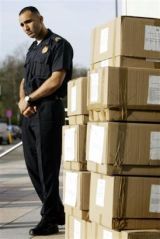ICC prosecutor close to launching Darfur prosecutions
Nov 23, 2006 (THE HAGUE) — The International Criminal Court is close to launching prosecutions against suspects believed responsible for atrocities including murder, rape and torture in Darfur, the court’s chief prosecutor announced Thursday.
 “Based on a careful and thorough source evaluation of all the evidence collected, we were able to identify the gravest incidents and some of those who could be considered to be the most criminally responsible,” prosecutor Luis Moreno-Ocampo told a meeting of states that have ratified the Hague-based court.
“Based on a careful and thorough source evaluation of all the evidence collected, we were able to identify the gravest incidents and some of those who could be considered to be the most criminally responsible,” prosecutor Luis Moreno-Ocampo told a meeting of states that have ratified the Hague-based court.
Moreno-Ocampo did not name any suspects being targeted by prosecutors or identify atrocities they are alleged to have taken part in.
But he said investigators have proof of crimes against humanity and war crimes including murder, rape, torture, deliberate attacks on civilians, persecution and forcible expulsions.
More than 200,000 people have been killed and about 2.5 million people displaced in three years of fighting in Darfur between African rebels and government troops allied with Arab militia known as janjaweed.
U.N. investigators have blamed the janjaweed for the bulk of atrocities such as murders, rapes, arson and looting.
Moreno-Ocampo’s announcement came a day after U.N. humanitarian chief Jan Egeland said there has been a “dramatic deterioration” in Darfur, where 4 million Sudanese are in desperate need of help as newly rearmed Arab militias and rebels escalate attacks and resume looting and burning villages.
Richard Dicker, of the New York-based Human Rights Watch, said he was very pleased with the announcement. He said the action came in “the context of ongoing horrific crimes being carried out both by the Sudanese armed forces and janjaweed militia against innocent civilians who remain at risk of the kinds of arbitrary killings, rape, torture and mutilations that have characterized the conflict in Darfur since 2003-2004.”
Dicker also dismissed Sudan’s move to set up a court for Darfur, saying it did little beyond “pay lip service” to prosecuting atrocities in the region.
Investigators carried out 70 missions in 17 different countries tracing victims, taking statements from more than 100 victims and witnesses and collecting documents, Moreno-Ocampo said.
However, they have been unable to carry out investigations in Darfur itself because of the ongoing violence.
Moreno-Ocampo said Sudanese authorities had provided investigators with a government-ordered report that found that “from 2003 to 2004 grave human rights breaches were committed by all parties to the conflict and that in Darfur murder and crimes against humanity had been committed by all parties to the conflict.”
The Sudanese report also “established that many allegations concerning incidents of murder have been attributed to … Janjaweed, either acting alone or together with elements of the Sudanese security forces,” Moreno-Ocampo said.
In May this year, Sudanese government officials detailed in writing Khartoum’s perspective on military operations in Darfur, Moreno-Ocampo said, adding that his investigators also interviewed two high-ranking civilian and military officials in Khartoum in August.
Moreno-Ocampo must now assess whether Sudanese authorities are making credible attempts to prosecute the same suspects and atrocities he is targeting. He said he should have finished that process by early next month.
If Moreno-Ocampo finds the Sudanese decides they are not, he will present his case to judges at the court who can then decide whether to file charges. Once that has been done, suspects would have to be arrested and transferred to The Hague — so far the court has only one suspect, alleged Congolese warlord Thomas Lubanga, in custody.
A hearing would then be scheduled to assess whether the evidence is strong enough to order suspects to stand trial.
Moreno-Ocampo also said his office continues to assess whether to launch a formal investigation in the Central African Republic, where there are reports of “hundreds of rapes, killing and looting.”
He also is assessing whether to investigate atrocities in the Ivory Coast and is investigating possible war crimes in three other undisclosed countries.
(AP)
